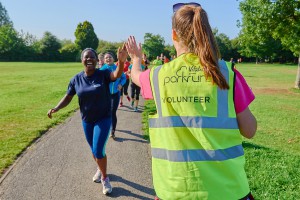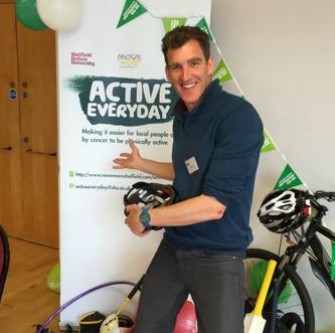How our practice ‘parkrun’ is benefiting patients and staff


Parkrun UK and the RCGP have just announced a project to link up GP practices with their local ‘parkrun’ – free 5km running events that happen every Saturday morning up and down the country.
Dr Ollie Hart describes how his practice set up a parkrun and the positive impact it has had on both patients and the practice staff.
Why did you do it?
My GP practice developed a link with the local parkrun six years ago. We were aware that parkrun was gaining popularity nationally and wanted to explore it to try to help our staff and patients join in the growing community. Many people find that joining a regular group helps make exercise social and is far more engaging, and more likely to generate long-term lifestyle change. We knew many of our patients with long-term conditions could benefit from exercise but simply telling them to join a gym isn’t realistic.
What did it involve?
Parkruns are free, friendly 5km running events that are now held in more than 530 open spaces around the country every Saturday. They are open to walkers, runners and volunteers of all ages, and each event has a volunteer ‘tail walker’ who provides support and encouragement and ensures nobody ever finishes last.
We decided to ask our then local parkrun if we could promote a ‘practice parkrun day’. They suggested we start up a brand new weekly event, as theirs was already pretty busy. So patients and staff fundraised (by way of a sponsored run, of course), and the council matched the money needed for the start-up costs. This gave us a real sense of ownership, but with so many events across the country to link up with, there is no need to necessarily start your own.
How do you recommend it to patients?
Now that we have a strong connection with the parkrun, we regularly find ourselves recommending it to staff and patients as an opportunity to be active, or join in with volunteering.
Unless someone is acutely unwell, or has an unstable cardiovascular condition, then exercise is safe and important for everyone. Recommending parkrun is one of a range of options we have depending on what that person needs and wants. We try to focus on what matters most to the person, and tailor support accordingly. Commonly getting fitter, or connecting with others is important, and this gives us an opening to talk about parkrun. For many we suggest support to walking the 5km first, building up slowly to running if they want. We always advise people to build up gradually, not causing themselves pain or taking themselves to extremes of exertion. Ensuring people work at the right pace for them ensures it is safe for all.
People do need to register online, and print a unique barcode, and sometimes we navigate people to libraries or digital support (for example, online cafes) to help with this. They are of course welcome to join in without a barcode, but they won’t get a time, and that event won’t count to earning their milestone T-shirt (for example after completing 10, 50, 100, 250 events).
What benefits have you seen?
I was amazed how quickly the parkrun event became a strong and mutually supportive community. I took the role of event director for the first year or so, but quickly other volunteers took over. One of our receptionists became event director, and has blossomed in the role. She now holds court each week with over 300 enthusiastic runners, joggers, walkers and natterers.
Many of our staff have become regulars at parkrun and this helps us recommend it to our patients. There is nothing like experiencing the welcoming atmosphere of parkrun to enable you to ‘sell’ its virtues.
That is not to underestimate the enormity of running 5km for many people. Some have been runners before and only take a little nudge, others have benefited from joining groups like ‘Couch to 5k’ and decided to graduate to parkrun. Others go simply to support or volunteer, and get drawn into the sense of belonging. There literally is ‘something for everyone’ – even a small volunteer role can make people feel they are playing a part. I have seen the benefits it brings in terms of building self-esteem and wellbeing. You can watch a video we made about it with testimonies from patients and staff here.
As a GP, I can honestly say that being involved with parkrun has been one of the most transformative features of my career personally and as a doctor. If I can support someone with conditions like depression, diabetes or dementia to feel confident to run, I have seen how it can change their life. It feels so much more positive than prescribing a pill. Of course, I still prescribe medicines but with parkrun it feels more like opening a door to new possibilities. I’m not doing the prescribing, people are taking the opportunity to create a healthy life for themselves.
What’s your advice to other practices?
I’m not saying every practice should set up a parkrun (although I bet you’d love the journey if you did). Parkrun attracts positive people who volunteer to support each other. It offers a very refreshing environment, and my experience is that it can ‘recharge’ tired and jaded staff, worn down by pressures of work.
This new parkrun practice initiative with the RCGP makes it easy for you to promote and connect staff and patients to your local events. It is a very simple process with practices contacting their closest event and discussing how they can support each other. It can be a simple conversation or a range of potential collaborations, there is no pressure for either side, just potential to connect and enhance opportunities for people to get active.
There is also an excellent toolkit that parkrun and RCGP have developed to give practices flyers, posters and stimulate ideas. The practice can download a certificate to display in the surgery to advertise their link.
As we increasingly recognise the benefits of social prescribing and activities to support the wider determinants of health, I think this sort of partnership working represents another great way for practices to link in with their local community. Together we create health, rather than just treat illness.
Follow this link to get going, it will only take a few minutes, but will add years of benefits to you, your team, and your patients.
Dr Ollie Hart is a GP partner at Sloan Medical Centre in Sheffield
Visit Pulse Reference for details on 140 symptoms, including easily searchable symptoms and categories, offering you a free platform to check symptoms and receive potential diagnoses during consultations.









